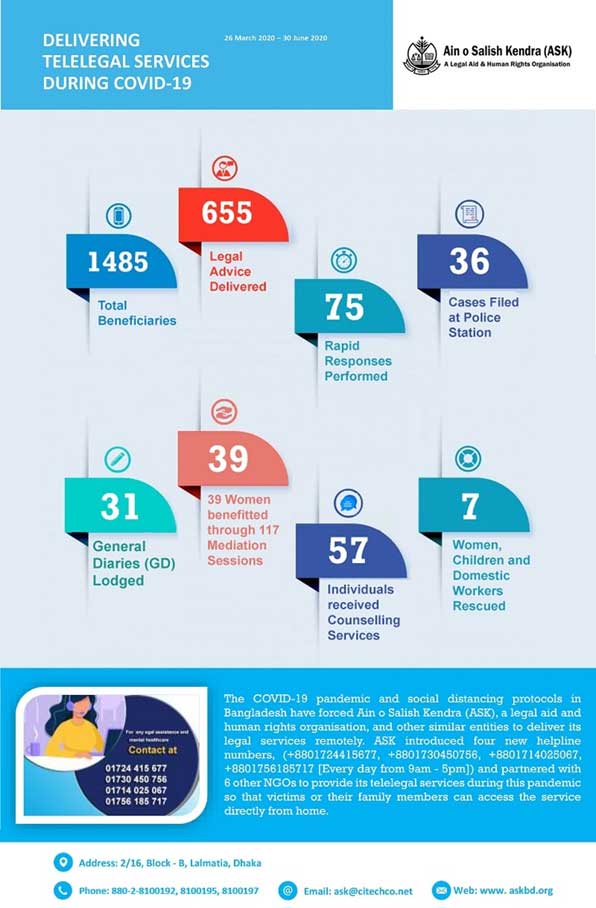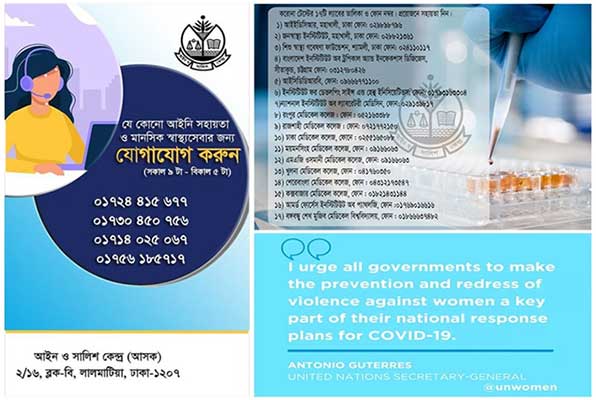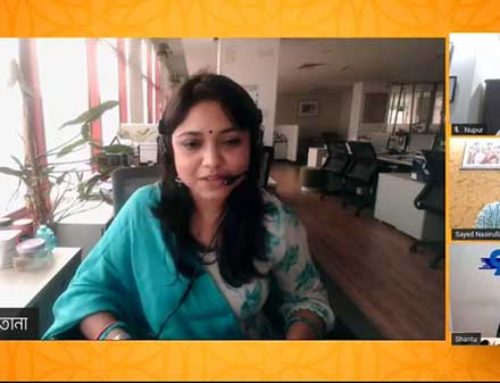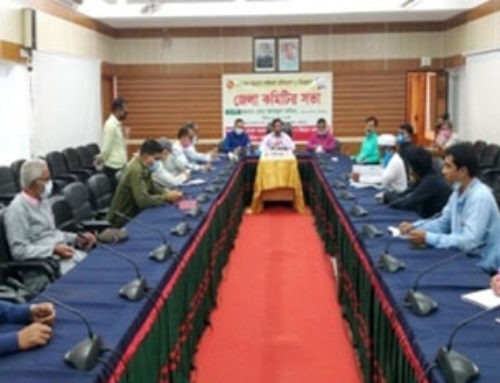Introduction of the Organisation
Ain o Salish Kendra (ASK) is a national human rights and legal aid organisation established in 1986 for the promotion and protection of human rights. It provides legal and social support to the disempowered and disadvantaged groups of Bangladesh, with special focus on women, working children and workers. Its mission is to protect and promote human rights of the disempowered and disadvantaged people through community activism and social mobilisation, capacity building, legal services, advocacy and policy intervention, by using rights based approach that encompasses the principles of human rights, equality, equity, secularism, rule of law, social justice and democracy. Its goal is to create a society based on equality, social and gender justice and rule of law. It seeks to create an environment for accountability and transparency of governance institutions.
After COVID-19 outbreak in Bangladesh, ASK followed the government’s directions and adopted ‘work from home’ strategy. After that, ASK began its office by activating roaster duty. Since Mid-August, ASK has started to continue its activities in a full swing.
Programmatic interventions in response to COVID-19
- Tele-legal services during COVID-19 – Target groups: legal service seekers, primarily women and children
ASK’s helpline services remained active during the COVID-19 period. In addition to the existing helpline number, ASK added 3 more numbers to reach and assist a larger and greater public who may be suffering from any sort of human rights violations. ASK’s staff lawyers had been providing the services to them over the phones. From 26 March to June, following services were provided-
- During this time, a total of 1485 individuals were benefitted
- 655 Legal Advices delivered
- 75 Rapid Responses performed
- 36 Cases filed at Police Station
- In view of the offences being committed, ASK assisted the victims and support seekers by lodging 31 General Diaries (GD)
- ASK conducted 117 Mediation sessions during this time, whereby 39 Women benefitted.
- ASK provided online psychosocial counseling services to 57 Individuals
- 7 Women, children and domestic workers rescued
- Social and digital awareness campaigns
ASK conducted multiple social and digital awareness raising campaigns through the distribution of COVID-19 related (digital) flyers and leaflets.



- Virtual Webinar Series
ASK, as the Secretariat of Human Rights Forum Bangladesh (HRFB), arranged 4 virtual webinars on four broad issues:
- Civil and Political Rights;
- Right to Health;
- Rights of Women and Workers; and
- Right of Marginalised and Disadvantaged groups.
- Human Rights Situation Reports
During the COVID-19 period, it highlighted the human rights situation and prepared monthly reports from March to May accordingly. In the reports, ASK focused on the different human rights violation during this pandemic and the role of the government or the lack thereof in addressing the human rights violations.
- Media Advocacy
ASK issued multiple press statements raising concern of the then human right situation, especially regarding the right to health and related services during the time of the pandemic.
- Communication with Local Human Rights Defenders & CBOs
ASK regularly maintained communication with HRDs and CBOs and collected information about different HRVs, take necessary actions at the local level through them, initiate awareness raising initiatives on emerging human rights issues like violence against women, domestic violence, child marriage, social stigma and discrimination etc through them.
- Communication with the Relevant authorities
ASK communicated with the relevant government authorities over the phone on the instances of human rights violation. ASK also drew attention of the government for taking immediate and necessary actions on the various human rights violations that continued to take place amid COVID-19 pandemic. A total of 92 urgent appeals were sent to the Ministry of Health and Family Welfare, Ministry of Home Affairs, Ministry of Local Government, Rural Development and Co-operatives, Upazila Nirbahi Officer (UNO), District Commissioners, Superintendent of Police, Civil Surgeons and hospitals. The letters were sent on issues related to the allegations against law enforcement agencies, UNO, Union Parishad members; instances of disappearances, allegations of medical negligence against hospitals and doctors, violence against vulnerable groups including women, religious minorities, etc. In all the instances, fair and neutral investigation was demanded with appropriate rememdies and punishment of perpetrators.
- Humanitarian support
As part of ASK’s COVID-19 response, ASK distributed relief to around 4000 family members and distributed about 4000 masks and 2000 soaps and 2000 detergent bars were distributed in Cox’s Bazar. The masks were prepared by the community women in Cox’s Bazar.
ASK also took help of the online medicine support services to provide medicines directly to the support seekers.
Future Activities
ASK is in the process to continue its activities for the year as per the plan. ASK will continue to raise awareness on all the human rights issues, gender based violence and the health rights issues. ASK continuously monitors the human rights situation of the country and will continue to do so as part of its activities and raise its concerns accordingly on the human rights violation. ASK is currently providing all its services in-person, and will continue to do so in the future.
Lessons Learnt:
- Utilisation of the digital platform effectively through adequate training. Being an analogous organisation, keeping track records and related material on papers, it was a challenge initially to record and document the human rights violations digitally;
- Adopt effective and updated strategies of conducting virtual training sessions;
Recommendations to the government
- To improve the health rights in general in Bangladesh:
- Ensure necessary health equipment for the health professionals;
- Increase number of testing kits for the testing centres;
- Increase number of testing centres increasing coverage beyond Dhaka;
- Ensure testing of more suspects around the country;
- Arrange more and better infrastructures to accommodate the treatment of infected patients;
- To tackle Covid-19 impacts on the rights of people in particular:
- Ensure increased access to information on COVID-19, symptoms, health rights, preventive steps, etc. (with special regards to the accessibility to the persons with disabilities & other gender [braille/audio/visual info materials]). During such public health crisis, the free flow of information is critical. The Government is obligated under human rights law to provide reliable information in accessible formats to all. The country must be prepared to handle the next wave of the pandemic when it hits.
- Conduct awareness raising on social distancing and on home quarantine and self-quarantine for the ones who are infected with or whose relatives have been infected with the virus;
- Utilise the digital platform to its best extent and restrain from misusing and abusing the Digital Security Act.
- Draft an economic plan and take measures to ensure rights and living standards of the poor and those working in the informal sector are not largely affected
- Take the day to day earners everyday crisis and the slum dwellers situation into consideration during the economic plan.
- General
- Retain the virtual judiciary and strengthen its mechanism and features to be prepared for the next wave; besides, the judiciary must consider remaining in both the digital and analogous platform to expedite the disposal of long-standing cases.
Recommendation to other national/local organisation
- Increase focus on the health rights situation of the country; the country lack specific focused organisation that deals with and or monitors the health rights situation as well as the hospital and health service providers.
Recommendation to other national/local organisation
- Address the emerging human rights violations as a result of COVID-19, including but not limited to health rights, domestic violence, torture, restriction of journalistic freedom of expression, etc.
Website link of your organisation’s COVID-19 response





